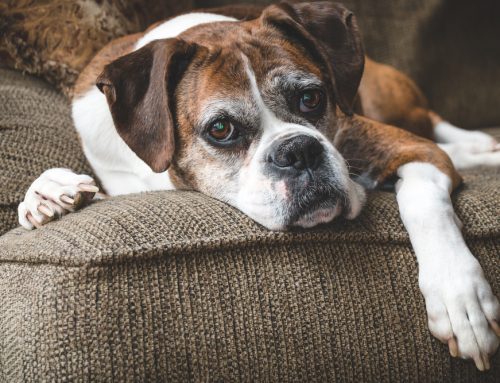To you, July Fourth means fun, food, and fireworks. To your pet, July Fourth means bustle, bother, and booms. Your pet can find the large crowds and loud, sudden noises frightening and extremely stressful. Our team at Palmer Veterinary Clinic wants to recommend tips that will help keep your pet calm and out of harm’s way during the revelry.
Tip #1: Flag your pet
The commotion during a large gathering may disturb your pet and cause them to seek quieter accommodations. They may find a moment when you are distracted and take the opportunity to bolt. Ensure your pet has a snug-fitting collar with accurate identification tags. Microchipping your pet provides the best chance of reuniting with them if they escape, but you must keep your contact information current. Also, take a picture of your pet so you will have a current photograph to post in the neighborhood if they go missing.
Tip #2: Let your pet party at home
Barbecues, parades, and fireworks displays are exciting for you, but these noisy gatherings can cause your pet anxiety. Leave your pet at home where they feel comfortable in a familiar space. If you are hosting a party, keep watch as you go in and out, so your pet does not make a sneak exit. Put signs on your doors alerting your guests to watch for your pet, and to not let them out. Ensure all doors and windows are secure, and consider making them a pet-safe zone in an interior room. Your pet will not be able to hear the fireworks displays and escape from an unsecured window or door. You can also leave soft music playing to help dampen any noise from outside.
Tip #3: Do not let your pet cheat their diet that day
Rich, fatty foods can cause your pet significant gastrointestinal upset and possibly pancreatitis. Numerous common human foods, including avocados, coffee, chocolate, grapes, onions, garlic, chives, and dairy products, are toxic to pets. Your pet may ingest a foreign object, such as plastic wrap, while gulping down prohibited garbage items, which could cause an intestinal obstruction that requires surgery. Keep all food and garbage in sealed containers, out of your pet’s reach. If they do eat a toxic food or foreign object, contact our team at Palmer Veterinary Clinic or Animal Poison Control.
Tip #4: Protect your pet from the dog days of summer
Any pet can suffer from heat exhaustion, but brachycephalic breeds, such as pugs and bulldogs, are more prone to overheating. Overweight and elderly pets are also more at risk. Watch your pet closely for signs of heat exhaustion. Keep them inside or in a shady area, if possible. Never leave them in a parked vehicle. Bring water and a water bowl on outings, and offer them a drink frequently. If they exhibit heat exhaustion signs, take them to a veterinary hospital immediately.
Tip #5: Desensitize your pet to the booms
If your pet becomes a quivering bundle of nerves when the fireworks display begins, consider using behavior modification techniques to help them cope with their fear.
- Record or download fireworks noises.
- Start playing the sound at a low level near your pet. If your pet stays calm, offer them a high-reward treat, or play their favorite game while the sound plays. The sound should predict the reward. Repeat this several times during the day.
- Over many days or weeks, gradually increase the sound’s volume. If your pet becomes anxious at any time, lower the volume to their comfort level. At the next session, start the volume at their comfort level, and raise the volume in smaller increments.
If your pet is exhibiting extreme anxiety, do not fuss over them, because they could see the extra attention as a reward for their fearful behavior. Do not scold your pet. They are genuinely afraid, and scolding them will make them more anxious and upset. Do not force them to experience the event. They may resort to aggressive behavior to escape the scary situation.
Tip #6: Determine if your pet should receive medical assistance
If your pet’s anxiety levels are excessively high around fireworks, and your attempts to dampen their fear have not been successful, ask our team at Palmer Veterinary Clinic If a mild sedative or anti-anxiety medication would help your pet deal with the bombastic holiday.
Tip #7: Scope out your yard before freeing your pet

Your pet is a master at finding new and intriguing elements when they explore. Fireworks debris from your neighbor’s yard may have drifted into your vicinity. Fireworks contain toxic substances, such as arsenic, potassium nitrate, and other heavy metals, which are dangerous to your pet if ingested.
You and your pet can have a stress-free holiday by following our recommendations. If you have concerns about your pet’s anxiety, or you would like to schedule an appointment, do not hesitate to contact our patriotic team at Palmer Veterinary Clinic.








Leave A Comment